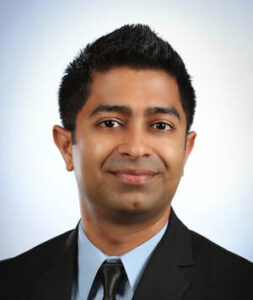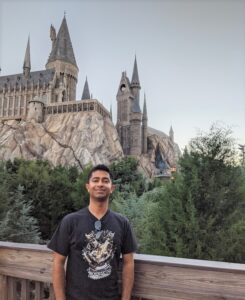Growing up in India, Praneet Tiwari had no intention of coming to the U.S. for school, let alone to teach or work. Life had other plans, or as Praneet said: “I would just call it destiny. Your life simply gets shaped by the different experiences, and every challenge offers a unique learning opportunity.”
 Today, Praneet is the president and owner of PraVal, Inc., an IT solutions company, a full-time lecturer at the Austin E. Cofrin School of Business at UW-Green Bay, and an instructor who teaches courses in the 100% online UW Master of Science in Data Science and UW Master of Science in Cybersecurity programs.
Today, Praneet is the president and owner of PraVal, Inc., an IT solutions company, a full-time lecturer at the Austin E. Cofrin School of Business at UW-Green Bay, and an instructor who teaches courses in the 100% online UW Master of Science in Data Science and UW Master of Science in Cybersecurity programs.
On a summer break during high school, Praneet took a web page design course and quickly discovered a knack for computer science. His interest piqued, and he learned how to code, starting with C, which Praneet describes as the “mother of all programming languages.” The more he learned about computer science and engineering, the more he became intrigued with how hardware and software interact together.
“When you know how things work, you can also figure out how things break,” Praneet said. “Software vulnerabilities can lead to hardware exploitation.”
After earning his bachelor’s degree in computer science, Praneet worked as a software engineer for a company that specialized in embedded systems development—very similar to Internet of Things (IoT) devices of today. He worked on a project to automate crane operations for a shipping port client in Norway. These embedded devices allowed an operator to simultaneously control multiple cranes from a single onsite tower or an offsite control room over the internet.
“That was when I realized that the idea of computers as standalone devices was no longer valid,” Praneet said. “If a device—whether it is a crane or a nuclear grid—is connected to the internet, then there is always a chance it could be compromised.”

Praneet knew that the world had a lot to offer and wanted to learn more in a country regarded as the world leader in technology. So, Praneet moved to the U.S. to attend graduate school. In 2010, he graduated from the University of North Texas with a master of science in computer science, specializing in data management and analysis.
Next, he worked in various roles as senior software engineer, director of software development, and chief technology officer (CTO). During his work as CTO for a leading healthcare analytics company, Praneet successfully migrated the entire IT infrastructure to Amazon Web Services (AWS) cloud. He ensured that the new infrastructure was both HIPAA and Service Organization Control (SOC 2) compliant and met the highly stringent cybersecurity standards expected from clients like Deloitte US and Navigant Consulting. It was in this last role that his interest and expertise in cybersecurity were most utilized. Soon after, he founded his own IT solutions firm, PraVal, Inc. and started teaching at UW-Green Bay.
Outside of work, Praneet describes himself as a “typical nerd” who likes to play on his Xbox, tinker with hardware and IoT devices, watch sci-fi shows, and travel.
The following Q&A with Praneet spotlights his experience as a UW Cybersecurity faculty member:
HOW DID YOU GET INVOLVED WITH UW CYBERSECURITY MASTER’S DEGREE?

I met Mike Zorn, the UW-Green Bay academic adviser for the UW Cybersecurity program, at an event. We started talking, and he mentioned that UW Extended Campus was starting an online cybersecurity program. UW Extended Campus has some of the best instructional designers who helped me translate my industry experience into a user-friendly, learning-conducive environment.
One of my first meetings was with instructional designer Nate Ewings. He really helped me figure out how to best deliver my industry experience through the CYB703: Network Security coursework. I needed to put myself into the shoes of a student. To develop a high quality course, I asked myself: “What do students really want to take away from the network security course? What are some of the practical applications that books don’t really dive into?” I am really happy with how the course turned out.
In addition, students will be pleased to know that both the CYB703: Network Security course and the UW Master of Science in Cybersecurity program worked to incorporate key knowledge units from the guidance issued by the National Security Agency’s (NSA) National Centers of Academic Excellence in Cyber Defense.
Get Program Guide
Learn more about our 100% online degree and certificate programs.
WHAT CAN STUDENTS EXPECT FROM YOUR COURSE?
I’m a big proponent of applying the concepts you’ve learned in your course in real world scenarios. One of the most difficult problems that students face when they are trying to learn something new is accepting that they aren’t going to know everything right away.
I try to give students a push in the right direction. And from there, I can give them pointers to go and acquire more in-depth knowledge on their own. There’s no hand-holding in my course because the cybersecurity landscape changes every day, so our focus is to develop core skills which can readily adapt to the evolving digital environment. As enterprises move more toward the cloud computing environment and as the IoT becomes a part of our daily life, the associated security risks grow exponentially. Gone are the days where cybersecurity was only a concern for IT administrators.
I’ll provide the tools. The job of the student is to explore those tools and utilize them in different situations—and to not be afraid to be wrong when figuring it out. There’s no one-shot solution for cybersecurity problems. You need to develop curiosity and the willingness to fail in order to learn.
WHY SHOULD PROSPECTIVE STUDENTS CONSIDER THE UW MASTER OF SCIENCE IN CYBERSECURITY?

The UW Cybersecurity degree program offers four tracks to deepen your learning: digital forensics, cyber response, governance & leadership, and security architecture. You can think of these as specific pathways students can focus on within the cybersecurity world.
As a UW Extended Campus program, a huge benefit is that the degree is 100% online. Secondly, the students who apply for this program typically have a lot of industry experience. This means you will be working with peers who bring different perspectives, which fosters rich discussions.
Thirdly—which I find the most critical—students complete a lot of labs. In UW Cybersecurity, we are all about hands-on learning. You not only learn cybersecurity concepts, but you also apply them through the use of our Virtual Lab.
Finally, the experiences and background of our faculty really make the program stand out. We designed the master’s degree with industry applications in mind, keeping up to date with ever-evolving cybersecurity developments.
WHAT ADVICE DO YOU HAVE FOR PROSPECTIVE OR CURRENT STUDENTS?
It doesn’t matter if you’re a software developer, a systems administrator, or even a manager: Cybersecurity affects everyone. I think it’s high time people recognize the importance of cybersecurity, because if you don’t pay attention to security implications, you ultimately lose your customers’ trust.
If you are involved in the process of expanding your business digitally, you need to be aware of cybersecurity. Our courses are designed with students from diverse backgrounds in mind, so you don’t fall behind the cybersecurity curve.
Want to learn more about how expert faculty members and instructors, like Praneet Tiwari, teach and prepare UW Cybersecurity students for in-demand careers in the field? Check out the program’s curriculum or contact an enrollment adviser at 1-877-UW-LEARN (895-3276) or learn@uwex.edu.










